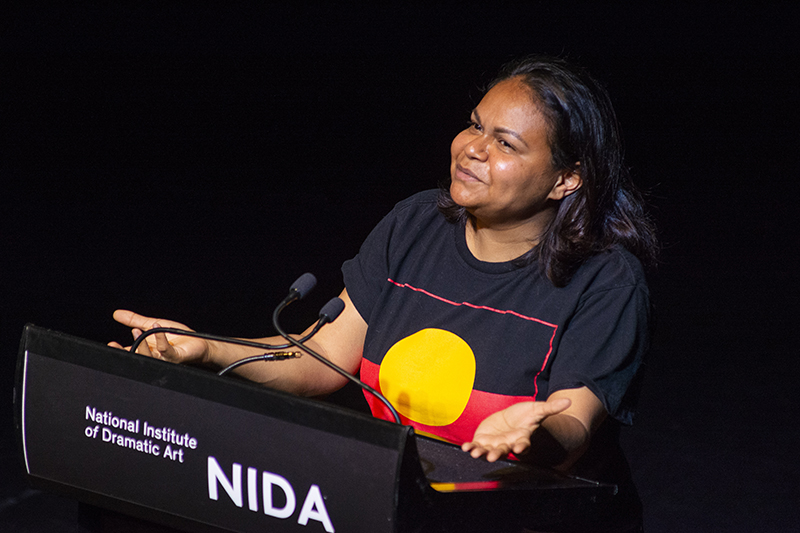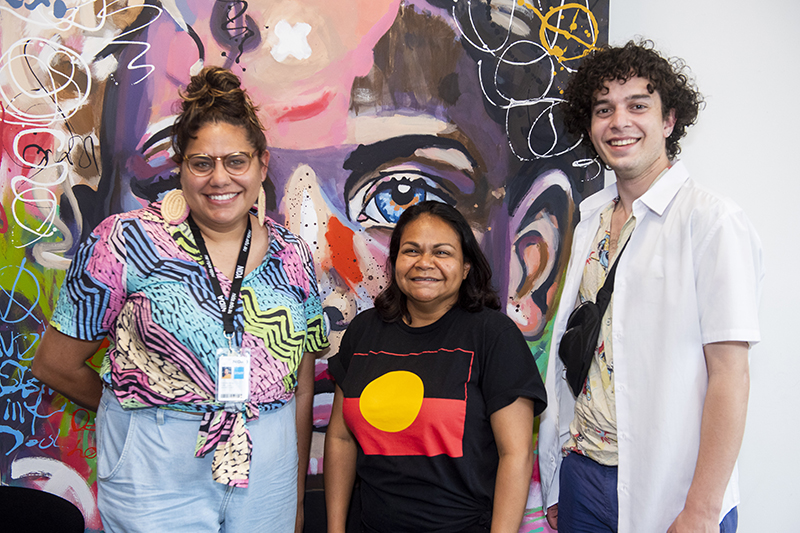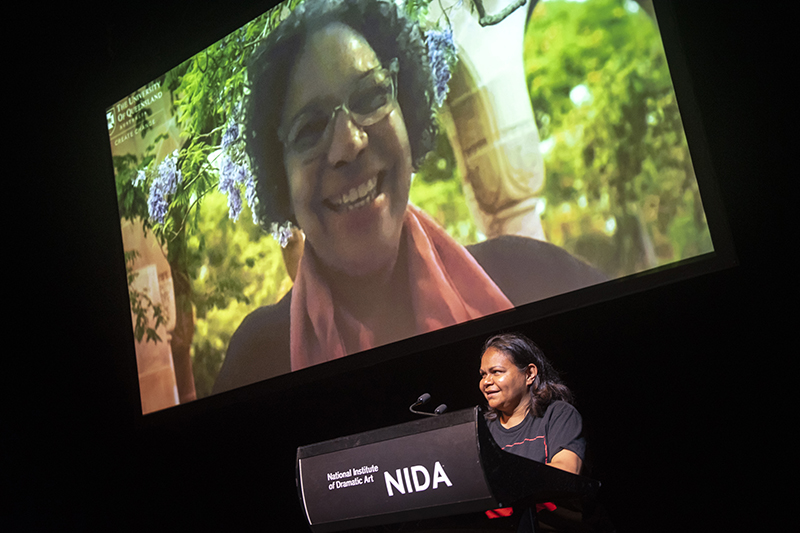
In a NAIDOC Week premiere, singer, songwriter, actor and playwright Ursula Yovich delivered a special address for the film, tv and theatre industry at the National Institute of Dramatic Art (NIDA).
Widely lauded for her work as an actor, playwright, singerandsongwriter,Ursulagrew up in Darwin andManingrida. Herwork inBarbara and the Camp Dogs,which she co-wrotewith Alana Valentineand starred in, was described as ‘[ripping] open a chasm of pain’,’plumbing gut-wrenching truths’and’compelling empathy’ (Canberra Times).
Her address inaugurated the new NAIDOC Week Lecture series, specifically targeting creative practitioners in the film, tv and theatreindustries. It is planned to be at least a decade-long commitment from NIDA, with a new, original commissioned lecture presented by a First Nations leader in the arts and culture sector every year.

(L-R) Inclusion Liaison Officer and 2017 Acting alumna Dalara Williams, Ursula Yovich and second-year Acting student Ariel Long at NAIDOC Week morning tea for Indigenous staff and students.
‘Inclusivity shouldn’t be something we have to think hard about,’ Ursula told the audience. ‘We shouldn’t be thinking about quotas or ticking boxes because that’s seen to be doing the right thing – we should be thinking in stories and connections.’
NIDA CEO Liz Hughes says, ‘I’m incredibly excited about launching this series. We really want to highlightimportantFirst Nationsvoices in theAustralianculturalsector and ensure that they are heard loudly.
‘Her authority, her integrity, her knowledge and her magnetic presence make her an extraordinarily compelling force – whether on stage, screen, through her writing, or any other medium.
‘The way she engages with performance and connects with an audience is immediate, I encourage everyone to hear her deliver the very first NAIDOC Week Lecture.’

(L-R) CEO Liz Hughes, Ursula Yovich and second-year Acting student Umina Shah-Munro at NAIDOC Week morning tea for Indigenous staff and students.
In her lecture, Ursula demonstrated the value of diversity and inclusion through two powerful, personal stories – one from her childhood, and one from her present.
Growing up, she told the audience how she would wake up at 6am on weekends to watch ABC’s music video program, Rage. Despite her deep love of music, Ursula said, ‘I never felt that I could become a singer because that career path was not for people like me – definitely not for a small-town Aboriginal girl.
‘I was from the kind of people that the news depicted as criminals, alcoholics, down-and-out long grasses that needed to be removed from the city because they were an eyesore.’
‘I just came from a café in Marrickville called the Vesbar. My agent Naomi met me there. I love going to this café, it’s just up the road from my place. I go there in my pyjamas sometimes. It’s owned by a first-generation Vietnamese man by the name of Van. He grew up in Cabramatta. He’s a real larrikin. A lot of people are drawn to this café because the staff, and Van, are warm and friendly, and they make you feel like you’re part of the family.

Ursula Yovich at lectern for inaugural NAIDOC Week Lecture Series at NIDA; NIDA Board Member Dr Sandra Phillips speaking from Queensland on screen behind.
‘Now there’s this one manin particular thateveryone kind of developed a soft spot for. He was a customer. His name was Gary. Gary lived in a shelter in theneighbourhood. He was homeless. He was homeless probably because he had a disability. He was always cheerful, and he’d come in most days and give everyone a ‘fist pump’, then he’d sit down at a table, usually the one near the door so he could watch the world, and he’d have his usual coffee and banana bread.
‘Even though Gary was homeless and lived in a shelter, he always paid for his coffee and banana bread. It wasn’t always the correctamountbut Van and the staff didn’t worry about that because he always made the effort to make any kind of payment, even if it was only two bucks.
‘He said Gary passed away a couple of days before. He had moved to another shelter during Covid, a shelter that could support him and his cancer treatments… I felt thisreally deepsadness come over me. I thought, I’m never going to see that cheery soul again. I’m never going to have a fist pump and his little mumbled chats and his banana bread face, and he had this funny lopsided grin.

(L-R) CEO Liz Hughes, first-year Properties and Objects student Madison Williams, Inclusion Liaison Officer and 2017 Acting alumna Dalara Williams, Ursula Yovich and second-year Acting student Ariel Long at NAIDOC Week morning tea for Indigenous staff and students.
‘When we include allpeople we get a rich tapestry of what our culture is.We get the finer details. And most importantly,we get to feel deeply.Butwhen we continue to churn out a dysmorphic view of our world in the arts, this abnormal and monochromatic view of our society, we miss out on meeting our Garys of the world, and we don’t get to hear his story.
‘We have a long way to go, but we are on that path. Even though we’re moving at a snail’s pace. We have wonderful stories out there that reflect other parts of ourcommunity as a whole.Top End Wedding,Mystery Road,Gods of Wheat Street… bit of shameless plugging there. It wasactually reallyhard to find these shows.Family Law, that’s one of myfavourites.Fresh off the Boat. But that’s not enough. We need to see more of these diverse stories.
‘So how do we challenge the status quo? Well, it starts in the schools, it starts in the way we teach, it starts in the way we learn. It starts here, at NIDA. It’s about creating safe spaces, and a place where our students and teachers can feel comfortable enough to tell their stories and not be judged.
At the end of her address, Ursula told NIDA students and the wider industry practitioners:’Your role today, from today onwards, working in theatre, film, the arts, is that you must reflect the current context in which you live and reside in. Tap into that potential. The world is big. Create a platform for those worlds.’
